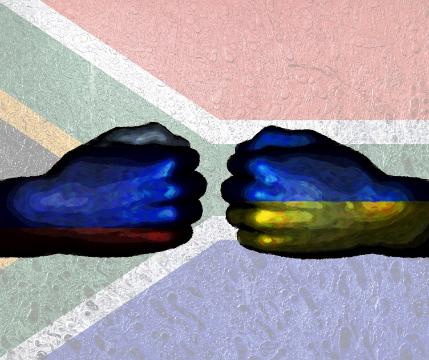
The South African government’s hesitancy to react strongly and appropriately to Russia’s aggression on Ukraine is both morally questionable and economically imprudent. The hesitancy is due partly to the ANC’s historical links to the USSR and the Union’s support in the fight against Apartheid. It can also be linked to the current political and economic ties that South Africa has with this former Soviet Union country. The most negative impact of the current war for South Africa could be changes in trade with Europe.
Russia has increasingly become an important trading partner for South Africa, through both bilateral and multilateral arrangements, for example through regional bodies like the BRICS. We exported agricultural goods, minerals and manufactured products valued at more than a billion rand in 2021 to Russia, a figure that had increased by more than 20% from the previous year. Exports include citrus, apples, cars, manganese ore and platinum. However, South African exports to Russia are significantly small compared to those going to the EU, which has been our biggest exports destination for decades. South Africa’s exports to Germany alone are worth around R100 Billion, with a large share of them consisting of manufactured products like vehicles.
While some argue that the pressure on Russia from global sanctions would open doors for some African countries in natural gas exports to Europe, and benefit South African exports through increased demand for inputs like palladium, as well as through the rise in the price of gold, the costs would most likely outweigh these opportunities. The effects of fuel price increases that are expected from the already rising price of crude oil will have far-reaching economic and societal impacts. With a diversion of EU resources towards the war crisis, petrol price would be pushed even higher. The demand for South Africa’s non-essential products is also likely to decrease as a result of decreased EU purchasing power.
For many African governments that rely heavily on EU transfers and subsidies into their public revenues, the effects would be direct and devastating. At a micro level, more negative effects would be felt on activities including donor-funded research, which have already been crippled by the Covid-19 pandemic.
It therefore makes economic sense for the ANC-led government to take a stronger stance against Vladimir Putin’s actions. The ANC must add to growing voices globally demanding that Russia stops immediately its attacks on Ukraine, its infrastructure, people as well as its democratically elected government. This voice must find expression not only from the country’s government to Russia’s state officials, but also through the AU and BRICS platforms. In the long term, developing and least developed countries will carry a big socio-economic burden from the war in Ukraine.
Morally, it is irrational to use loyalties stemming from historical friendships with the USSR as excuses not to be directly vocal against the actions of Putin. This morally questionable behaviour includes proceedings at the recent UN’s General Assembly discussions, where South Africa alongside with China and India (all members of the BRICS nations) abstained to vote on a resolution that condemned “in the strongest terms the aggression by the Russian Federation against Ukraine in violation of Article 2 (4) of the [UN] Charter”.
The war that Putin is waging is not only against former members of the Soviet Union, but also against blood relations of the Russian people. With such actions, Mr Putin cannot be seen as a moral beacon and representative of the USSR and its friendship and support towards many Africans during their struggles against colonial rule.
For South Africa, the values of democratic freedoms and human rights that were fought for during the Apartheid years contrast sharply with Mr Putin’s dictatorship and his promotion of unelected proxy governments that he has been actively propping up outside Russia’s borders to deter what he terms the encroachment of NATO. He needs to be openly criticised on moral grounds for promoting political repressions on a global scale. He cannot be supported simply because of his access to military and economic power, as well as his political influence in different regions. In 2001, elements of the ANC leadership, including Mr Nelson Mandela, initially supported Mr George W. Bush’s invasion of Afghanistan, before being morally persuaded against such support. More recently, similar decisions overlooking democratic principles and values of accountability were made by many ANC members and leaders regarding Mr Jacob Zuma as president. These decisions were swiftly followed by regret at not speaking out until after the State had been captured and corrupted. The opportunity and time not to repeat the same mistake is now.
